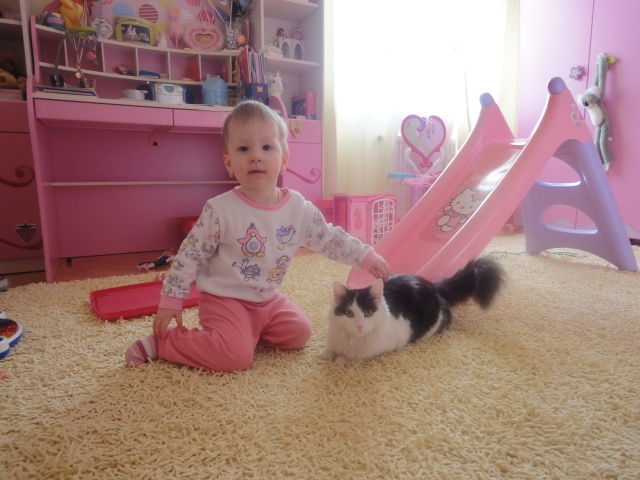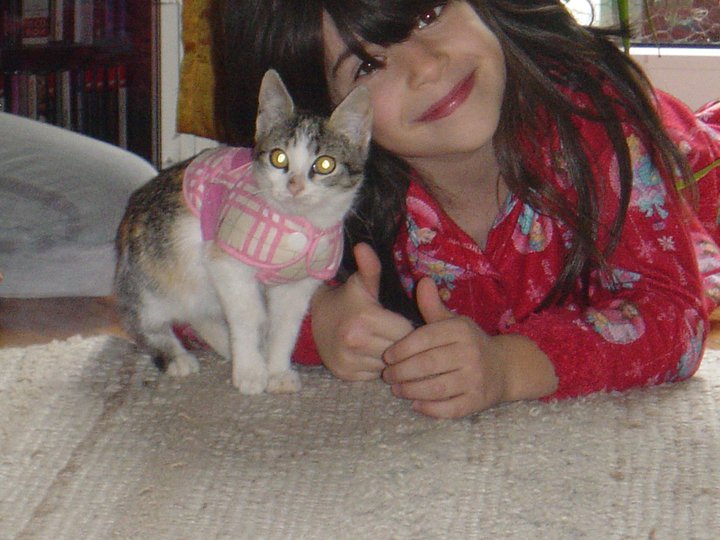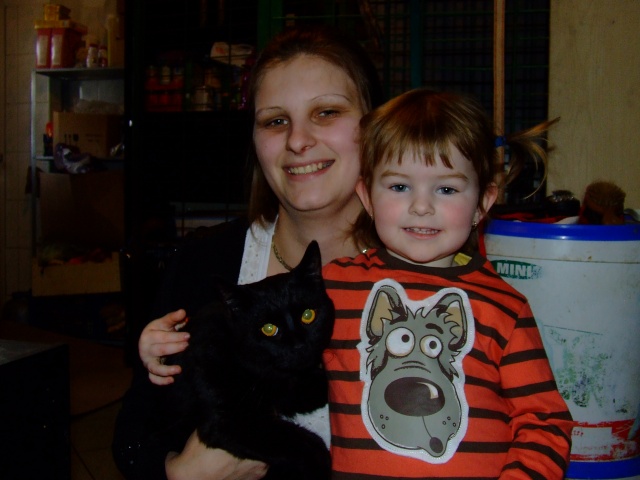There are no more articles in this theme in your language.
Cat and child
2011.08.20.
Those who don't have a pet, can't imagine how good it is when a little furball is a member of a family. And those who don't have children, don't understand how exciting child rearing is. When you have both life is full, at least for me.
Of course, a child's need is not the same as a pet's need; so, you have to pay close attention to a lot of things to fulfill everyone's expectations and to keep the peace of the family. During pregnancy, you're afraid of everything that can endanger the health of your baby. If you have a cat those half information, what you hear, make your sensitive state of mind upset, for example about toxoplasmosis, which indeed may be dangerous at the early period of the pregnancy. But 99% of the population have had this disease already without their knowledge, because you may get this from vegetables or fruits that are not well washed or from uncooked or undercooked meat (let's just think about steak tartare or sushi).With proper hygienic rules the danger is technically zero, and even a blood test can show if you already had this disease.

There are parents who donate their pets, in the moment, when the pregnancy becomes real to avoid the child getting an infection. But keeping in touch with animals is important for the development of the child's character. You are frightened by such rumors that the cat lies down on the baby's chest and prohibits their breathing. Cats like soft, warm, and comfortable places for resting, but this is not a reason for panic. With some attention you can avoid this. No matter how much I love my 'velvet-feet' member of the family, I would not let my cat enter my child’s bed, whom I wouldn't leave alone, without control, to be honest.

Parents should pay attention to washing their hands profusely after spending time with the cat and also make sure the baby does not lick the cat. Our darling should get vermifuge before the arrival of the baby and while the baby is young, this intervention should happen more often than usual.
You should know well that the cat is a predator, which means that they will defend themselves from any perceived danger. There's a part of the child's development when they want to taste everything – it might be the tail or other part of the cat, or the child might be somewhat cruel with your hairy family member, so it's not the cat's fault if it senses the child's actions as a threat.

It is the parent's responsibility that the child should not have to experience the cat protecting itself. Even though cats are clever and will avoid the the two-legged family member, accidents might happen, for example, when the baby is crawling on the parquet.
The baby grows up and becomes a small kid who can learn a lot from their furry friend. Like what? Empathy. The young child learns not to pull the cats tail. Tolerance. Can't you see the cat is sleeping? There is immense happiness as the child and the kitten play hide and seek or hare and hounds.

The child learns responsibility, the love of animals, and attention. This situation of life teaches the child endurance, consistence, and regularity. That child who grows up with a cat (or dog) will never be cruel, but more sensitive to their pets than their fellow companions, and their love for animals will remain persistent their whole life. Nowadays when we meet the irresponsibility of humanity, it is extremely important that new generations would respect and love animals, and know how to treat them well.

'Any glimpse into the life of an animal quickens our own and makes it so much the larger and better in every way.' (John Muir)
Of course, a child's need is not the same as a pet's need; so, you have to pay close attention to a lot of things to fulfill everyone's expectations and to keep the peace of the family. During pregnancy, you're afraid of everything that can endanger the health of your baby. If you have a cat those half information, what you hear, make your sensitive state of mind upset, for example about toxoplasmosis, which indeed may be dangerous at the early period of the pregnancy. But 99% of the population have had this disease already without their knowledge, because you may get this from vegetables or fruits that are not well washed or from uncooked or undercooked meat (let's just think about steak tartare or sushi).With proper hygienic rules the danger is technically zero, and even a blood test can show if you already had this disease.

There are parents who donate their pets, in the moment, when the pregnancy becomes real to avoid the child getting an infection. But keeping in touch with animals is important for the development of the child's character. You are frightened by such rumors that the cat lies down on the baby's chest and prohibits their breathing. Cats like soft, warm, and comfortable places for resting, but this is not a reason for panic. With some attention you can avoid this. No matter how much I love my 'velvet-feet' member of the family, I would not let my cat enter my child’s bed, whom I wouldn't leave alone, without control, to be honest.

Parents should pay attention to washing their hands profusely after spending time with the cat and also make sure the baby does not lick the cat. Our darling should get vermifuge before the arrival of the baby and while the baby is young, this intervention should happen more often than usual.
You should know well that the cat is a predator, which means that they will defend themselves from any perceived danger. There's a part of the child's development when they want to taste everything – it might be the tail or other part of the cat, or the child might be somewhat cruel with your hairy family member, so it's not the cat's fault if it senses the child's actions as a threat.

It is the parent's responsibility that the child should not have to experience the cat protecting itself. Even though cats are clever and will avoid the the two-legged family member, accidents might happen, for example, when the baby is crawling on the parquet.
The baby grows up and becomes a small kid who can learn a lot from their furry friend. Like what? Empathy. The young child learns not to pull the cats tail. Tolerance. Can't you see the cat is sleeping? There is immense happiness as the child and the kitten play hide and seek or hare and hounds.

The child learns responsibility, the love of animals, and attention. This situation of life teaches the child endurance, consistence, and regularity. That child who grows up with a cat (or dog) will never be cruel, but more sensitive to their pets than their fellow companions, and their love for animals will remain persistent their whole life. Nowadays when we meet the irresponsibility of humanity, it is extremely important that new generations would respect and love animals, and know how to treat them well.

'Any glimpse into the life of an animal quickens our own and makes it so much the larger and better in every way.' (John Muir)
A Tetszik gomb eléréséhez sütik engedélyezése szükséges.
 Megosztom a Facebookon
Megosztom a Facebookon

 Magyar
Magyar Deutsch
Deutsch









